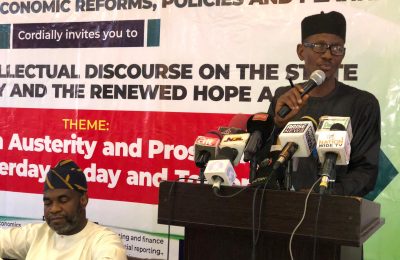
IN Africa, despite increasing cases of neurodegenerative disorders, including Parkinson’s disease, a shortage of health professionals and expensive drugs for treatment may continue to make more people die early and have poor quality of life, an expert has warned.
Richard Walker, an honorary professor of ageing and international health at North Tyneside General Hospital, stated this in a lecture entitled ‘Neuroepidemiology in Africa: A focus on Neurodegenerative Disorders’ and book launch to celebrate the retirement of a neuroscience colossus, Professor Adesola Ogunniyi, at the University of Ibadan (UI).

Professor Walker stated that the incidence of Parkinson’s disease, stroke and other neurodegenerative disorders is increasing in Africa due to increasing life expectancy, genes, exposure to pesticides and an ageing population.
“It is shown that if you’re aged 15 to 64 in Tanzania and you’re a man, you’re more likely to die from a stroke than someone in England and Wales, and it’s the same for women. Actually, stroke is a big issue in Africa, but the biggest factor that drives stroke everywhere in sub-Saharan Africa and the biggest risk factor for mortality in the world is hypertension.
“The life expectancy has also increased in the last 30 years, meaning a lot of older people who are at risk of stroke and other neurodegenerative diseases are going to increase dramatically in the next 30 years.
“Parkinson’s disease is increasing worldwide; the older you get, the more likely you are to get Parkinson’s disease. Genetics is a very important cause, but something that’s really relevant to Africa is exposure to pesticides and trace metals like manganese, which may make people susceptible to them.
“But Parkinson’s disease was more common than previously found in Africa. In Tanzania, we found only a fifth of them knew they had Parkinson’s previously. If you don’t treat it, people will die early. One of the biggest issues is affordable drugs for Parkinson’s disease in Africa. If they are available, they’re not affordable.
“So, there is a large burden of neuro-degenerative diseases, including Parkinson’s disease and dementia, and we can do a lot to prevent these conditions, potentially treat them, and improve quality of life.”
In their separate goodwill messages, the Vice chancellor of UI, Professor Kayode Adebowale; Provost of the College of Medicine, Professor Olayinka Omigbodun and the Chief Medical Director of University College Hospital (UCH), Professor Jesse Otegbayo, described Professor Ogunniyi as a humble professional, mentor and erudite scholar with over 40 years experience in the field of neurology.
READ ALSO FROM NIGERIAN TRIBUNE








